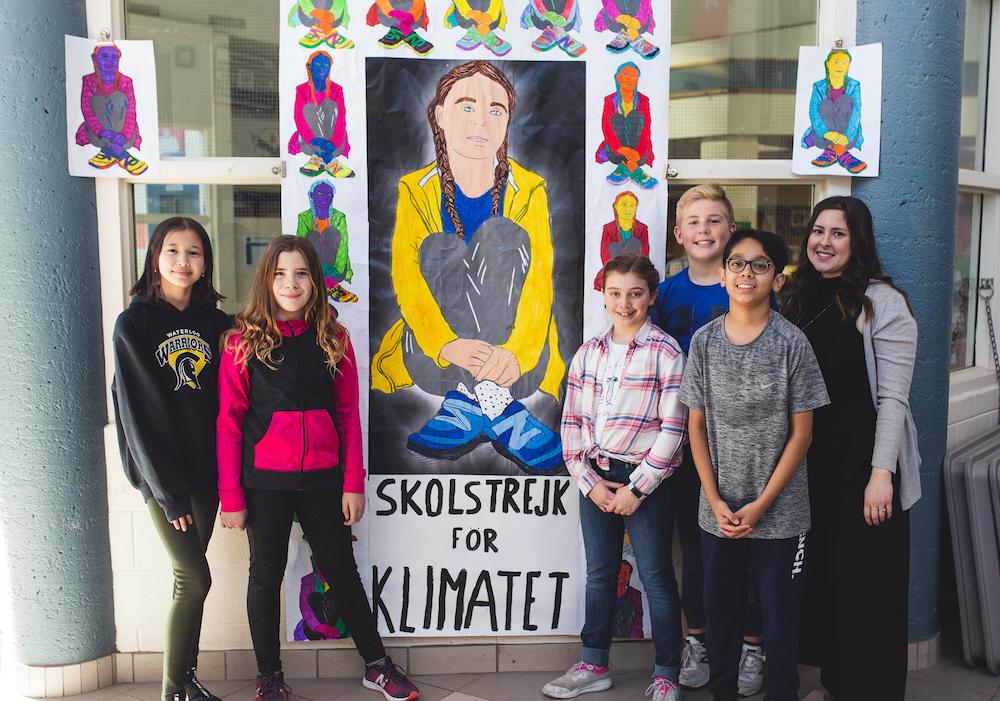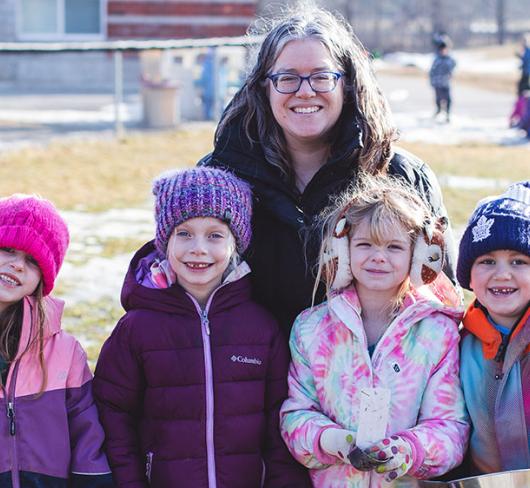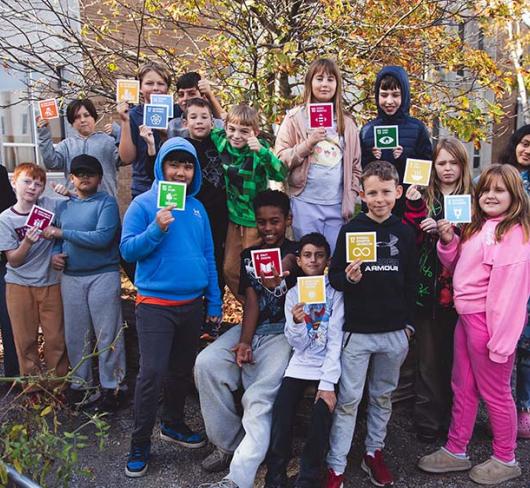
The World Needs a Lesson
Teachers, we need you. Teachers, we maintain an imperative position in teaching and leading students, families and communities into climate action. While it feels uncomfortable to read about climate change and climate change is often considered too depressing to talk about, before you stop reading know that avoidance is a much more deadly strategy. If you’re not having a visceral response or a flutter of adrenaline reading today’s climate related headlines, you’re living in denial. If you go a whole day without considering climate change, you’re not hearing the urgency of the situation. Pain for the world, including guilt, dread, grief, outrage and despair are normal, healthy and widespread responses of compassionate humans to a world in trauma. Dr. Joanna Macy, a respected voice in peace and ecology movements, suggests that confronting the pivotal psychological reality of our time is necessary to move from inaction to agency. Let’s briefly acknowledge the immensity of the planetary emergency together before equipping ourselves with the tools of healing, hope and transformation to lead the way in climate change education.
Growing evidence exists that children feel hopeless about the future of the planet. Perhaps you’ve had a child come to you, as I have, in tears about their uncertain future. Or heard an adolescent wonder if they will be able to live out their full life before it becomes a nightmare. This is a frighteningly rational response when faced with the possibility that our children could be one of the last generations of the human species. The UN’s Intergovernmental Panel on Climate Change (IPCC) says that there are 10 years left to make significant changes to avoid catastrophic consequences from climate change. Since Rachel Carson’s Silent Spring in 1962, which propelled governments, scientists and citizens into action globally, the environmental movement thus far has made statistically no impact on carbon emissions nor our trajectory. Rather the carbon dioxide (CO2) emissions have more than doubled since the 60s according to the Emission Database for Global Atmospheric Research. David Suzuki describes the movement, despite localized successes, ultimately as a failure. As an 83-year-old man, Suzuki says if he knew how long it would take us to take action, he would have gone into education much earlier.
MOVING FROM EMPOWERMENT TO AGENCY
We know that higher levels of scientific knowledge do not automatically mean increased climate action. Yet we are still largely operating under the assumption that educating people on the science of climate change will empower them to take action. The field of Climate Change Education has more recently been drawing on strategies from Holocaust and genocide education, which also consider the socio-emotional context essential in engaging learners with difficult content, rather than pushing them away. Dr. Elin Kelsey has been working on the issue of hope and the environment for the past decade, which inspired her viral hashtag #OceanOptimism. Her research in palliative care, oncology and grief work, where content is emotionally difficult and hopelessness is more openly discussed, provides vital insights. In Propagating Collective Hope in the Midst of Environmental Doom and Gloom, Kelsey finds that hope is an important mechanism to move from empowerment to agency. She reminds us that hope can be taught. Through her interviews, Kelsey reveals that sources of hope for people can be found in small actions of other people and individual hope can build and sustain larger, collective hope. She urges educators to nurture communities as sites of collective hope and reminds us that emotions are contagious. When people have a sense of belonging to their communities they become sources of motivation, support and resilience. Schools are natural sites of community and are well-positioned to be a positive source for hope for many because mitigating climate change will require us to work together.
TEACHING HOPE
In order for climate change education to be most effective, it must reduce feelings of helplessness. In 2016, UNESCO began the Getting Climate-Ready pilot project, an initiative in 25 countries to help targeted schools engage in climate actions to reduce the effects of climate change. The project reached approximately 200,000 students and 12,000 teachers worldwide. Evaluated in a Canadian context, the following list of good practices for climate change education was developed. Good climate change education approaches and practices:
- Providing students with opportunities to design and implement climate action projects
- Ensuring the information presented in class is personally relevant and meaningful
- Learning extended to outside the classroom through community partnerships (e.g., connect with your local green organizations, municipalities, conservation authorities to open up the conversation on how you can support and build a reciprocal relationship)
- Education for Sustainable Development (ESD) integrated across the curriculum; all classes must include ESD at some point (e.g., find the growing bank of resources at the Worldslargestlesson.globalgoals. org for all 17 goals, for all ages happening globally)
- Students at all levels learn about Indigenous cultures, the environment and climate change
- School-wide challenges to reduce climate change (e.g., Waste Free week, Walk to School month, Lights-out lunches, etc.)
- Climate action programs are offered in all grades led by students (e.g., TerraCycle, Crayola Cycle, battery recycling, compost, and recycling programs)
- Research projects to learn about local actions for reducing community’s impact (e.g., students invest their time and effort towards real world problems and solutions to impact their local environment and community)
Source: Building Climate-Ready Schools in Canada: Towards Identifying Good Practices in Climate Change Education, 2018
OTHER HELPFUL RESOURCES
Drawdown.org
As the world’s leading resource for climate solutions, this organization reviews, analyzes and identifies the most viable global climate solutions and shares these findings with the world. The website supports us in having solution-based and hopeful conversations. Divided by Energy, Food, Women and Girls, Buildings and Cities, Land Use, Materials and Transport you are sure to find a solution to connect to your science or social studies curriculum.
OurWorldInData.org
Maps provide an excellent visual to see the significant impact humans are having on the environment, especially over time. Our World In Data’s goal is to make progress against the world’s largest problems. Find a plethora of well-sourced, often interactive maps to analyse with your students but start with these two.
The UN Sustainable Development Goals (SDGs) Tracker (sdg-tracker.org) – an easy way to deepen your lessons with the SDGs providing visual and up to date information about all 17 goals.
The Greenhouse Gas Emissions by Hannah Ritchie and Max Roser – a comprehensive article offering more than a dozen maps. CO2 emissions by fuel type and by sector respectively allow you to look globally as well as country specific. Hit play on CO2 emissions per capita map and watch where carbon emissions dramatically increased from the 1800s through the industrial revolution. In just 2.3 days the average Canadian emits as much as the average Nigerian in a year.
Answer the Urgent Call to Educators
Join educators who declare solidarity with the students’ uprising for climate justice action to make urgent changes to the business-as-usual of education – at all levels and across all disciplines. Sign the Call to Action at educators-for-climate-action.org and stay connected with Greta’s #FridaysforFuture.
No One is Too Small to Make a Difference – Greta Thunberg
The audiobook narrated by Greta is a collection of her speeches that have made history across the globe, from the United Nations to mass street protests, and is extremely powerful to listen to. A rallying cry for why we must all wake up and fight to protect the living planet, no matter how powerless we feel.
FreshEd with Will Brehm
Elevate the conversations with your colleagues with this weekly podcast hosting conversations of education in a global context, often highlighting Canadian and Ontario educational programs and policies. Peruse the archives to find a high level of discussion on topics not limited to refugee education, free speech, race, PISA, sexuality education, Indigenous education, student loans, and child labour.
Relevant Episodes:
#180 – Education in Times of Climate Crisis
#170 – Teaching Life (interview with Armand Doucet, an award-winning teacher recognized around the world. Nominated in the Top 50 for the Global Teacher Prize, Armand is a high school history teacher in New Brunswick.)
#144 – Climate Change, Education, and Sustainability
#140 – Measuring and Monitoring the SDGs
David Suzuki’s CliMate chatbot
A fun and interactive conversation coach uses a five-step conversation model to teach you how to have constructive conversations about climate change, cultivate empathy and to find common ground with people who have different views than you. Overcoming polarization is key to moving forward on climate solutions.
- Eco Schools Canada The new Eco Schools Canada platform offers an abundance of resources.
- K-12, cross-curricular lesson plans from letter-writing campaigns to citizen science, building vermicompost, challenges to land-based education of Indigenous–settler relations and waste audit templates
- Campaign kits such as Great Gulp, Earth Hour, Food Matters or use the step-by-step “Designing an Effective School-wide Campaign How-to” for your own project
- External Grants & Awards divided by season provides a concise overview of funding available for your projects
- The Eco Calendar helps identify all the eco-related days throughout the year, many of which are UN days of significance. March 22: World Water Day, April 16-22: Earth Week. April 22: Earth Day, May 3-9: International Compost Awareness Week, May 9: International Migratory Bird Day, May 25-29: Bike to School Week
Learning for a Sustainable Future
Register for one of LSF’s Youth Forums that provide outstanding grassroot support for eco teams. The full day of hands-on, practical learning always leaves my team with more skills and confidence to take on climate change.
R4R.ca
Resources for Rethinking’s goal is to provide Canadian students with the experiences required for responsible citizenship. Their advanced search engine connects teachers to free lesson plans, action projects, books, videos and other materials from organizations across the country to explore the environmental, social and economic dimensions of important issues from K-12. Filtering by grade, province, theme, sustainable development goal or resource type makes it easy to integrate climate change education into your program.
Using the “What a Dump!” STEM series of lessons students learn about environmental, civil, and sanitation engineering by designing and building model landfills that hold the most garbage, minimize costs, and prevent trash and contaminated rainwater from polluting the nearby city. Teams test their landfills, graph and compare designs for capacity, cost and performance.
CONCLUSION
While climate change needs to be a conversation that we have in every class, we must be sensitive to the socio-emotional complexities of our learners, the content and ourselves if we are to move from knowledge and understanding to application and agency. So before describing the horrifying impacts of plastic pollution, Kelsey reminds us to “consider a hopeful framing around these dire issues, otherwise hopelessness emerges as a profound threat.”
Sarah Lowes is a member of the Halton Teacher Local.

